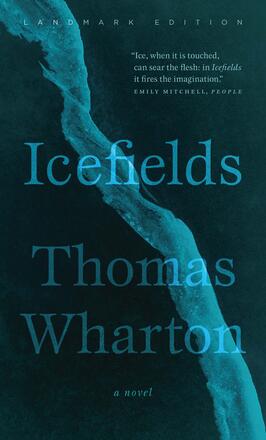
Icefields
Landmark Edition
Description
First published in 1995, Thomas Wharton’s Icefields is an astonishing historical novel set in a mesmerizing literary landscape, one that is constantly being altered by the surging and retreating glacier and unpredictable weather. Here—where characters are pulled into deep chasms of ice as well as the stories and histories they tell one another—is a vivid, daring, and crisply written book that reveals the human spirit, loss, myth, and elusive truths. Edited by Smaro Kamboureli.
Awards
- Winner, Best First Book, Commonwealth Writers Prize, Canada and Caribbean Division 1995
- Winner, Writers Guild of Alberta's Best First Book Award 1995
- Winner, Banff Mountain Book Festival Grand Prize 1995
Reviews
Praise for Icefields:
". ..careful dialogue, a steady pace and cool, subtle prose. ... through a skillful juxtaposition of scientific observations, dialogue and journal entries and letters, fact is successfully merged with fantasy. ... a well-told tale is definitely worth the pursuit, as both the doctor and Mr. Wharton's readers will discover. "
~ Pamela Stock, New York Times Book Review
"Icefields is a novel of crystalline beauty from a writer to watch. "
~ Ronald Wright, Times Literary Supplement
"Ice, when it is touched, can sear the flesh: in Icefields it fires the imagination. "
~ Emily Mitchell, People
"Wharton has ably captured the turn-of-the-century feel of rural Canada, complete with boosterism, a Victorian adventuress, and teahouses in the wilderness. "
~ Dennis Drabelle, Washington Post Book World
"Wharton is an original writer and Icefields is an original novel. "
~ Mark Giles, Calgary Herald
"Ironic, brilliant, and unforgettable. "
~ Peter Simpson, Telegraph-Journal
"[Wharton] is stalking what, for a young writer, is rarefied game indeed: the playful ways in which people's private mythologies just barely intersect, if at all. "
~ Michael Harris, Los Angeles Times
"Wharton reminds us again that, though we should attempt to look at nature on its own terms, we must do it in a human, loving way. "
~ Alexander Rettie, Alberta Views
". ..an astonishing first novel, for it's scope, structural integrity, consistent beauty, and language. "
~ Jill Robinson, Edmonton Journal